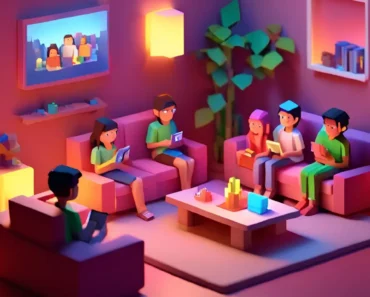Why Gen Z Parents Embrace Screens
Gen Z parents, aged 15–30 in 2025, grew up as digital natives, immersed in smartphones and social media. A 2024 Pew Research study shows 98% of Gen Z adults own smartphones, and 90% use social media daily. This fluency shapes their parenting, leading them to reject screen-free childhoods in favor of tech-integrated lives.
They see screens as essential for modern skills. A 2024 survey found 85% of Gen Z parents believe tech exposure prepares kids for digital careers, like coding or content creation. Educational apps, used by 75% of U.S. kids under 12, offer interactive learning, from math to languages. Social platforms like TikTok, where 80% of Gen Z parents are active, per 2025 data, help kids connect with peers. Gen Z Parents Reject screen-free ideals because they view technology as a gateway to opportunity, not a barrier, aligning with their digital upbringing.
Benefits of Tech-Positive Parenting
Gen Z’s embrace of screens offers clear advantages for U.S. families when managed thoughtfully.
Enhanced Learning Opportunities
Apps like Khan Academy or ABCmouse, used by 70% of U.S. kids, make education engaging. A 2024 study found kids using educational apps score 15% higher in math and reading, boosting confidence.
Social Connection
Screens enable kids to stay connected, especially in remote or busy households. A 2024 report noted 80% of kids aged 6–12 use messaging apps, reducing isolation and fostering bonds.
Creative Expression
Platforms like YouTube or Procreate let kids create videos or art. A 2025 survey found 65% of kids engage in creative digital activities, enhancing self-expression.
Future-Ready Skills
Early tech exposure builds digital literacy, critical for 85% of future jobs, per 2024 forecasts, preparing kids for tech-driven careers.
These benefits explain why Gen Z Parents Reject screen-free childhoods, seeing tech as a tool for growth.
Read Also: Teaching Kids Digital Empathy: A Survival Guide
Challenges of Tech-Positive Parenting
Embracing screens comes with hurdles that Gen Z parents must address to ensure healthy development.
Excessive Screen Time
Kids average 7 hours of daily screen time, per 2024 data, raising concerns about focus and sleep. A 2024 survey found 60% of parents struggle to enforce limits.
Mental Health Risks
Social media can trigger anxiety, with 55% of U.S. teens feeling pressure from online comparison, per 2024 studies, challenging parents to monitor emotional health.
Parental Modeling
Gen Z parents, with 90% using social media daily, per 2024 data, risk setting poor examples, making it harder to enforce rules.
Online Safety Concerns
Inappropriate content worries 70% of parents, per 2025 data, requiring vigilance to protect kids online.
These challenges highlight why Gen Z Parents Reject screen-free ideals but must balance tech use carefully.
Strategies for Balanced Tech Parenting
– Prioritize Educational Apps: Engage kids with apps like Duolingo, used by 70% of families, to make learning fun, per 2024 data.
– Teach Digital Safety: Guide kids on privacy settings and safe sharing, using resources like Common Sense Media, recommended by 60% of parents in 2025.
– Model Healthy Habits: Limit parental screen time to 2–3 hours daily, showing balanced behavior, as practiced by 55% of Gen Z parents, per 2024 surveys.
– Encourage Offline Activities: Schedule tech-free time, like sports or reading, boosting connection in 80% of families, per 2024 studies.These strategies ensure Gen Z Parents Reject screen-free childhoods while fostering balanced, healthy kids.
External Resources
- Pew Research Center – Gen Z parenting trends
- American Psychological Association – Tech’s cognitive impacts
- Common Sense Media – Best educational apps for kids
Conclusion: A Tech-Smart Parenting Approach
Raising Confident Kids with Technology
Gen Z Parents Reject screen-free childhoods in 2025, embracing technology as a tool for learning, connection, and creativity in U.S. families. Their digital-native perspective sees screens as pathways to future-ready skills, with 85% believing tech prepares kids for modern careers. Challenges like excessive screen time and mental health risks require careful management, but strategies like clear limits, educational apps, and offline bonding create balance. By modeling healthy habits and teaching safety, Gen Z parents ensure tech enhances development. Their approach shows why Gen Z Parents Reject screen-free ideals, building a tech-smart, connected future for their kids.
Frequently Asked Questions About Gen Z Parenting and Tech
Why do Gen Z Parents Reject screen-free childhoods?
They see tech as essential for learning and connection, with 85% believing it prepares kids for digital careers, per 2024 data.
What benefits do screens offer kids?
Screens boost learning, social bonds, and creativity, with 70% of kids using educational apps and 65% creating digital content, per 2024–2025 studies.
What challenges do Gen Z parents face?
Excessive screen time, mental health risks, poor modeling, and safety concerns affect 55–70% of U.S. families, per 2024–2025 data.
How can parents balance kids’ screen use?
Set 2-hour daily limits, use apps like Google Family Link, and encourage offline activities, as practiced by 65% of parents, per 2024 data.
How do Gen Z parents ensure online safety?
They teach kids privacy settings and use resources like Common Sense Media, recommended by 60% of parents in 2025.





